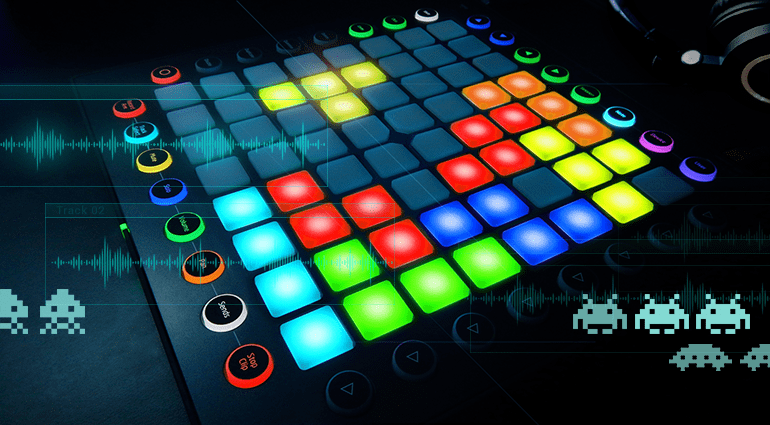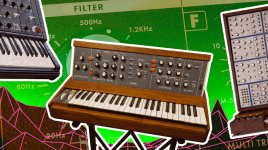
Who actually writes the music for these interactive blockbuster games?
Since the conception of the computer game, there has been computer game music. While the very first games usually only emitted a few thin beeps and bloops, game music soon underwent a similarly rapid development parallel to the development of graphics. From the humble sound chips of the consoles and computers of the 1980s, then 8-bit and 16-bit sound cards, we are now accustomed to full-resolution musical scores within our video gaming experience. We often take these soundtracks for granted but must acknowledge that they are often as elaborately produced as the music of Hollywood film productions. Music often constitutes the very special appeal of a game, and also remains one of the most memorable elements (keyword: earworm). Let’s learn more about this phenomenon.
With the technical possibilities, the way in which music is used or could be used in games also changed. When video games became a mass phenomenon in the 1980s, music initially came from simple synthesizer chips with very limited possibilities. Today this sound aesthetic is affectionately called “Chiptune“. The SID of the Commodore C64 – a 3-voice analog synthesizer on one chip – enjoys real cult status. If you look at the rudimentary possibilities, it is almost unbelievable what the composers elicited from this chip. Here is a compilation:
You are currently viewing a placeholder content from Youtube. To access the actual content, click the button below. Please note that doing so will share data with third-party providers.
Then followed PC sound cards, which produced their sounds first by FM synthesis and later with PCM samples. At that time, the soundtrack of most games consisted of MIDI files that were made to play by the computer’s sound card. These sounds depended heavily on the hardware used (namely the Yamaha YM3812 sound chip), only some time later, when memory became cheaper and the processors faster, it became possible to play digital audio files within a game. This opened the door for elaborately produced soundtracks whose sound no longer depends on the hardware. This video explains the evolution quite well:
You are currently viewing a placeholder content from Youtube. To access the actual content, click the button below. Please note that doing so will share data with third-party providers.
In early arcade and console games, music often had a certain cartoon characteristic. This was partly due to the cheesy sound of the chips, but also to the compositions. In jump ‘n’ run classics like the Super Mario series, the sound effects for jumps, hits, throws and other actions almost became part of the music and encouraged people to keep playing. But even then it became clear how much music can contribute to the effect of a game. Especially Mario, the Zelda series, Mega Man and Final Fantasy set standards with soundtracks that gave each level a very special atmosphere. Pixelated graphics and 8-bit sound, start to finish – the best games of that time fascinated the player no less than today’s super realistic game worlds, and the sound of composers like Yoko Shinomura, Manami Matsumahe and Koji Kondo made an immense contribution. You can hear their unique styles in the following three videos:
You are currently viewing a placeholder content from Youtube. To access the actual content, click the button below. Please note that doing so will share data with third-party providers.
https://www.youtube.com/watch?v=-rPuk_6Ykj0
You are currently viewing a placeholder content from Youtube. To access the actual content, click the button below. Please note that doing so will share data with third-party providers.
The switch to previously recorded studio-produced audio soundtracks opened up entirely new musical possibilities for game designers. Now anything that can be used in films, to provide musical accompaniment, can also be used in games! So the music of today’s computer games works with all stylistic devices and clichés that are also used in film music: From leitmotifs linked to certain characters or actions, to instruments such as strings or horns, with which one instinctively associates certain emotions, to silence, which, when used correctly, can have a more than violent emotional effect. Here are some examples:
You are currently viewing a placeholder content from Youtube. To access the actual content, click the button below. Please note that doing so will share data with third-party providers.
Even if you may not always be aware of it, music plays a crucial role in how deeply you emotionally immerse yourself in a game. And it doesn’t always have to be through a cinematic score. Some famous games use music in another very effective way, for example by being directly experienced by the protagonist in the respective scenes. A perfect example are the unforgettable interactive radio stations of the Grand Theft Auto series, which created an incomparably immersive experience. And they elegantly solved a challenge that distinguishes game music from film music: In games, the music must be able to adapt to the game’as context at any time. When a scene is over, a fight is over or a protagonist has died, the game is not stopped until the music is over. This is where adaptive music (also called dynamic or interactive music) comes into play, this is music whose volume, rhythm or tune changes in response to specific events in the game. And it shouldn’t sound strange when the music suddenly stops or changes, that’s where the art lies. Besides the calculated play with emotions, this is one of the most demanding musical tasks game composers have to deal with. An illustrated example:
You are currently viewing a placeholder content from Youtube. To access the actual content, click the button below. Please note that doing so will share data with third-party providers.
But who are the creative minds behind the game soundtracks? Although video game music has established itself in the meantime and is certainly no longer laughable, only a few game composers are in the spotlight. Here we briefly introduce some of them.
Jesper Kyd
The Danish composer is mainly known for his groundbreaking scores for the Assassin’s Creed series. His portfolio of nearly 30 years of music for video games also includes other popular titles such as the Hitman series, Borderlands and State of Decay. In his compositions he combines classical instruments such as orchestra and choir with electronic elements.
You are currently viewing a placeholder content from Youtube. To access the actual content, click the button below. Please note that doing so will share data with third-party providers.
Harry Gregson-Williams
This Brit is actually more of a film composer and wrote the music for several Hollywood blockbusters, including Shrek, Spy Game and Phone Booth. His music for the Metal Gear Solid series (from episode 2) can be described as groundbreaking. The scores by Harry Gregson-Williams showed how music can work in today’s computer games – with all Hollywood-style hooks and lots of emotional power.
https://www.youtube.com/watch?v=jUho_LJbFfs
Jeremy Soule
His masterful use of the tonal possibilities of an orchestra has led to the American Jeremy Soule often being referred to as the “John Williams of game music”. His best-known titles include the Guild Wars and Elder Scrolls series, as well as Total Annihilation. So far Soule has created music for over 60 games!
You are currently viewing a placeholder content from Youtube. To access the actual content, click the button below. Please note that doing so will share data with third-party providers.
Darren Korb
With “Bastion” and “Transistor” Darren Korb created the music for two highly acclaimed indie games. He works a lot with sampled beats and rhythmic elements combined with acoustic instruments and synthesizers.
You are currently viewing a placeholder content from Youtube. To access the actual content, click the button below. Please note that doing so will share data with third-party providers.
Austin Wintory
With the music for “Journey”, Austin Wintory was the first game composer to be nominated for a Grammy. And if you listen to the soundtrack of the game, you will probably agree that he deserved it. Here orchestral elements come together with folk influences and create a unique world of sound. Absolutely beautiful.
You are currently viewing a placeholder content from Youtube. To access the actual content, click the button below. Please note that doing so will share data with third-party providers.
Yoko Shinomura
This Japanese composer is one of the musicians who laid the foundation for today’s game music in the 1980s, with modest technical means at the time. The scores of Yoko Shinomura are unforgettable, especially from “Street Fighter 2” and “Final Fight“. Later she wrote the music for “Super Mario RPG” and the “Mario & Luigi RPG“ series.
You are currently viewing a placeholder content from Youtube. To access the actual content, click the button below. Please note that doing so will share data with third-party providers.
There you have it folks! Which composer is your favourite? Or which video game music has been stuck in your head since you were a kid? Leave us a comment below.
7 comments
Leave a Reply
You are currently viewing a placeholder content from Facebook. To access the actual content, click the button below. Please note that doing so will share data with third-party providers.
More InformationYou are currently viewing a placeholder content from Instagram. To access the actual content, click the button below. Please note that doing so will share data with third-party providers.
More InformationYou are currently viewing a placeholder content from X. To access the actual content, click the button below. Please note that doing so will share data with third-party providers.
More Information





Michael Finn says:
Please look up one Thomas Dolby. He has done too many things to mention.
Joe says:
Definitely will, thanks Michael!
Patrick Grounds says:
What about Rob Hubbard. Surely the finest composer for the Commodore 64.
Joe says:
Oh wow! True! Thanks Patrick!
Domir ou Mourir en Essayant says:
I would really want to know who made the musics for Half Life 2, i dont know who the composer is but the musics were pretty intense and fun to listen. If anyone knows the name of the composer please to hesitate to tell me, i would apprecite it, thanks!
Kathy Karina says:
I’d like to know who composed the soundtrack for Half Life 2. I’m not sure who the composer is, but the music was quite strong. bike race
Joe says:
According to Google it was Kelly Bailey. Cheers!